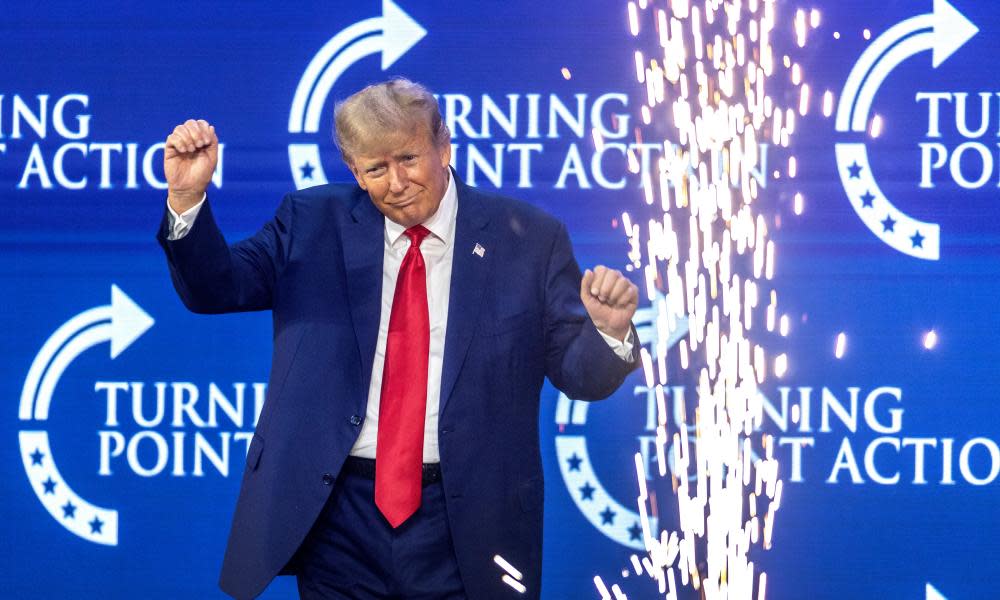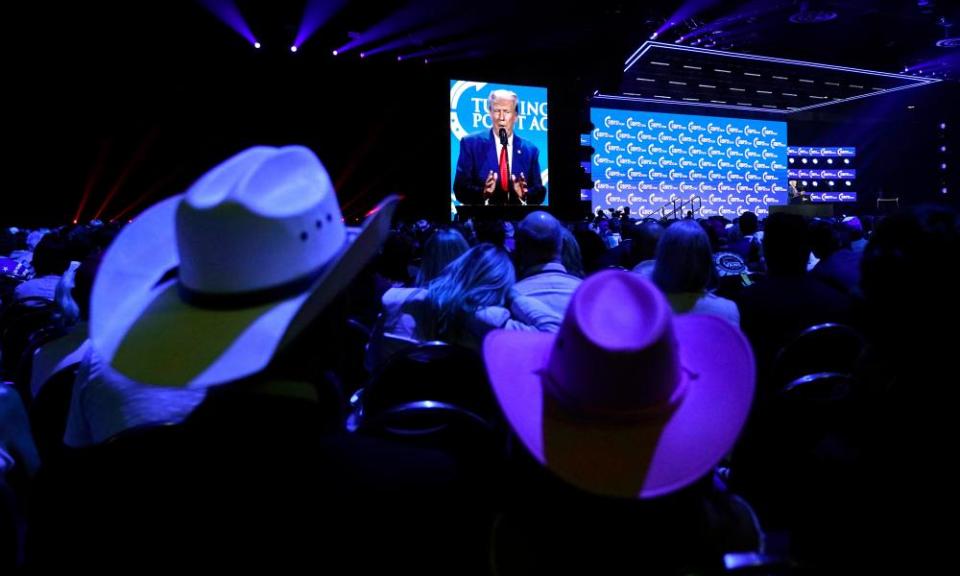Never Trumpers get ‘brutal wake-up call’ as Republican candidates flounder

For Asa Hutchinson, former governor of Arkansas, there were boos and chants of “Trump! Trump!”. For Francis Suarez, mayor of Miami, there were jeers and cries of “Traitor!” And perhaps most tellingly, there was no Florida governor Ron DeSantis at all.
The recent Turning Point USA conference brought thousands of young conservatives to Florida and there was no doubting the main attraction: former president Donald Trump, who made a glitzy entrance accompanied by giant stage sparklers. In a less than rigorous poll, 86% of attendees gave Trump as their first choice for president; DeSantis, who polled 19% last year, was down to 4%.
Related: Donald Trump’s legal problems: where does each case stand?
Events and numbers like this are cause for sleepless nights among those Republican leaders and donors desperate to believe it would be different this time. The Never Trump forces bet heavily on DeSantis as the coming man and the premise that Trump’s campaign would collapse under the weight of myriad legal problems.
But six months away from the first-in-the-nation Iowa caucuses, none of it seems to be working. DeSantis’s campaign is flailing and leaving some with buyers’ remorse. Hutchinson and Chris Christie, outspoken Trump critics, are polling in single digits, sowing doubts about voters’ appetite for change. Never Trumpers have reason to fear that his march to the Republican nomination may already be unstoppable.
“They’re experiencing a brutal wake-up call that the party is not interested in hearing critiques of Trump,” said Tim Miller, who was communications director for Jeb Bush’s 2016 campaign. “The Trump challengers’ candidacies have been astonishingly poor and learned nothing from 2016. When the leading candidate gets indicted and all of his opponents besides Chris Christie and Asa Hutchinson just echo his fake persecution complex talking points, it’s going to be hard to beat him.”
The Never Trump movement is almost as old as the celebrity businessman’s hostile takeover of the Republican party. In 2016, 50 senior Republican national security officials from past administrations signed a letter saying they would not vote for him, even though Trump was the nominee. Republicans including Colin Powell, a former secretary of state, openly backed his Democratic rival, Hillary Clinton, albeit in vain.
Hopes that Trump would “grow” into the presidency were soon dashed. In 2018, the White House whistleblower Miles Taylor wrote an anonymous column in the New York Times under the headline “I Am Part of the Resistance Inside the Trump Administration”, describing the president as unfit for office. Taylor went on to build a network of former government officials and advisers aiming to deny Trump a second term.
Former Republican operatives in groups such as the Lincoln Project and Republican Accountability Project welcomed Trump’s defeat in the 2020 election and hoped his part in a subsequent insurrection at the US Capitol would finally break the fever. But Senate Republicans squandered a chance to end his political career by failing to convict him in an impeachment trial.
Since then certain members of Congress have proved willing to criticise Trump on certain issues and a few, such as Senator Mitt Romney of Utah, are implacably opposed to him. But many others, such as Congresswoman Liz Cheney of Wyoming, have either retired or been purged.

As the 2024 election looms, there is no coordinated plan on how to derail the Trump train or alter the trajectory of a race that is still his to lose. Even critics admit that the external events many were counting on to thwart his candidacy have not hurt his standing.
Indeed, criminal indictments in New York and Florida have led some voters who were entertaining an alternative to return to Trump’s fold while handing him another fundraising bonanza. His campaign announced that he raised more than $35m during the second fundraising quarter, nearly double what he raised during the first three months of the year and well ahead of his competitors.
Trump’s opponents within the party are running out of time and ideas. Joe Walsh, a former Republican congressman, said: “They were all hoping that Trump’s legal troubles would kick him to the side of the road but every indictment or potential indictment just strengthens him among the base, eats up all the oxygen in the room and makes him the likely nominee. They’re probably as frustrated as can be.”
Many Never Trump hopes were pinned on DeSantis but the governor is already cutting staff and experiencing fundraising setbacks. Donors ignored the warnings of longtime political operatives who said DeSantis was “undercooked”, had a glass jaw and lacked the personal warmth and charisma required for retail politics. These appear to be have been borne out by a stagnant campaign in which the more exposure he receives, the less popular he becomes.
They put all their chips on DeSantis before they knew who he was
Joe Walsh, former Republican congressman
Walsh, who challenged Trump in the 2020 Republican primary, said: “They all bet on DeSantis without knowing who the fuck he was, without understanding that he’s really bad and weird with people and also mean and cruel, even more so than Trump. They put all their chips on DeSantis before they knew who he was. That was a mistake because they don’t have an alternative.
“There’s only one lane in this Republican party. That’s the Trumpy lane and DeSantis is in that lane with Trump. His problem is he can’t get past Trump but the base wants somebody like that and so there’s no other alternative. They’re really kind of screwed.”
Ominously for DeSantis, the Fox News owner, Rupert Murdoch, who had previously given the governor copious airtime and favourable coverage, has reportedly gone cold on him and resigned himself to the prospect of another Trump nomination. Fox News this week unveiled a lineup of prime-time hosts who have lauded the former president.
Republicans are doing little to dispel an air of inevitability around the former president securing the nomination again. When it emerged this week that he faces a third indictment, this time over his attempt to subvert democracy, rivals including DeSantis again parroted his claim that the cases are politically motivated.
Kevin McCarthy, speaker of the House of Representatives, where Trump had notched far more endorsements than his rivals, told reporters: “If you noticed recently, President Trump went up in the polls and was actually surpassing President Biden for re-election. So what do they do now? Weaponize government to go after their number one opponent.”
Just as in 2016, Trump is also benefiting from a divided opposition. Michael Steele, a former chairman of the Republican National Committee, suggests that Never Trumpers coalesced around DeSantis too soon. “The strategy shouldn’t have been necessarily backing that horse but sitting out a little bit to see how the field settled, to see if someone would emerge. Then you come in.”
Individual ambition has prevented Republicans from uniting around a strategy to stop Trump. Steele observed: “The party was unwilling in the first instance to have a come to Jesus meeting with all the candidates other than Trump and say, ‘OK, I get it, y’all want to be president but none of you is going to get there if you all stand so I need one of you to do that duty. So that means the rest of you get behind that one.
“‘Is it Nikki? [Haley] We’re all behind Nikki. Is it Christie? We’re all behind Christie. But one of you.’ And so that’s the word we send out to the party faithful … At the end of the day, this game is about winning general elections, not winning primaries and the Republican party is stuck on winning primaries to prove a point. And what’s that point? Oh, we lose general elections.”
The election is still more than 470 days away and the race is far from done. During the 2008 election campaign, for example, Hillary Clinton appeared to have a decisive lead for the Democratic nomination over Barack Obama while the eventual Republican nominee, John McCain, did not emerge as the frontrunner until January 2008.
In theory, Trump should be vulnerable. He comes with excess personal baggage including legal troubles that appeared to converge this week with fresh momentum. On Tuesday Trump revealed that he had been named as a target in special counsel Jack Smith’s investigation of interference in the 2020 election.
On the same day Dana Nessel, the attorney general of Michigan, announced criminal charges against 16 people who signed paperwork falsely claiming Trump won the election in that battleground state. Meanwhile Fani Willis, district attorney for Fulton county, Georgia, is preparing to present a case to a grand jury over Trump’s election subversion efforts there.
Bill Galston, a senior fellow at the Brookings Institution thinktank in Washington and former policy adviser to Bill Clinton, said: “There’s still a chance that the steady drip, drip, drip of indictments and other problems will open up a larger portion of the party to an alternative because they see him as increasingly risky, as someone who might well not only be indicted but convicted of a major crime, or more than one, during the presidential campaign.
“Will a lot of Republicans quietly come to the conclusion that’s not a risk worth taking? I don’t know. I find it very difficult to understand my own party and impossible to understand the other side.”
Christie and other critics have also made the case that Trump is an electoral liability, pointing out that, after his narrow win in 2016, Republicans lost the White House, House and Senate. They did regain the House in last year’s midterms but underperformed expectations. Trump’s campaigns are always risky and haphazard: he recently criticised Iowa’s popular governor, Kim Reynolds, for her seemingly cosy relationship with DeSantis while she purports to be neutral.
Related: Struggling DeSantis and Pence attack criminal justice law they championed
Several groups that oppose Trump’s candidacy have begun spending big money on efforts to undermine his support. Win It Back Pac, an independent Super Pac with ties to the conservative Club for Growth Action, recently spent $3.6m on an advert that features a purported Trump supporter who has grown tired of the former president’s antics. Americans for Prosperity Action, part of a network founded by the billionaire Koch brothers, has also sought to weaken Trump through door knocking and phone calls.
But for now, Trump is still the 800lb gorilla of the Republican party. He is dominating polls, drawing huge crowds and shaping the narratives by which other candidates define themselves. Just as in past recent elections, that leaves Never Trump Republicans with few palatable options except to put country before party.
Walsh, the former congressman, said: “If you really believe Trump is unfit then you have to do what me and Liz Cheney and so many others have done and that’s just say we’re going to throw our support behind the Democratic candidate, Joe Biden, even though it goes against our policy interests, because Trump has to be stopped. Clearly he can’t be stopped in the primary so he has to be stopped in the general.”